
Entertainment
-
 Greece introduces ‘MyCoast’ App to tackle beach violations
In an effort to enforce newly implemented stringent beach regulations, Greece has launched the ‘MyCoast’ app, empowering users to report beach violations effortlessly.03 May 2024Read More...
Greece introduces ‘MyCoast’ App to tackle beach violations
In an effort to enforce newly implemented stringent beach regulations, Greece has launched the ‘MyCoast’ app, empowering users to report beach violations effortlessly.03 May 2024Read More... -
 European Court of Human Rights rejects Kirkorov’s case against Lithuania entry ban
The European Court of Human Rights (ECtHR) has dismissed a complaint filed by Russian pop star Philipp Kirkorov against Lithuania's decision to bar his entry into the country.23 April 2024Read More...
European Court of Human Rights rejects Kirkorov’s case against Lithuania entry ban
The European Court of Human Rights (ECtHR) has dismissed a complaint filed by Russian pop star Philipp Kirkorov against Lithuania's decision to bar his entry into the country.23 April 2024Read More... -
 Risnjak National Park: Croatia's hidden gem wins Europe's top spot
Nestled within Croatia's picturesque Gorski Kotar region, Risnjak National Park emerges as a beacon of untouched beauty, earning recognition as one of Europe's premier destinations sans the23 April 2024Read More...
Risnjak National Park: Croatia's hidden gem wins Europe's top spot
Nestled within Croatia's picturesque Gorski Kotar region, Risnjak National Park emerges as a beacon of untouched beauty, earning recognition as one of Europe's premier destinations sans the23 April 2024Read More... -
 Swiss castles experience record visitor numbers
In 2023, the National Association of Swiss Castles witnessed a historic milestone, welcoming over 1.3 million visitors to its 28 castles. This achievement marks a new record for the organization,23 April 2024Read More...
Swiss castles experience record visitor numbers
In 2023, the National Association of Swiss Castles witnessed a historic milestone, welcoming over 1.3 million visitors to its 28 castles. This achievement marks a new record for the organization,23 April 2024Read More... -
 Underground surge: Belgium grapples with 2,214 illegal gambling websites
Research conducted by gambling analysis firm Yield Sec has unveiled a concerning trend in Belgium's online gambling landscape. According to their findings, a staggering 2,214 illegal gambling14 April 2024Read More...
Underground surge: Belgium grapples with 2,214 illegal gambling websites
Research conducted by gambling analysis firm Yield Sec has unveiled a concerning trend in Belgium's online gambling landscape. According to their findings, a staggering 2,214 illegal gambling14 April 2024Read More... -
 Flanders and Brussels Embrace Slow Art Day, inviting visitors to savor artistic experiences
On April 13th, several museums in Flanders and Brussels will once again host a variety of activities as part of Slow Art Day, an annual tradition aimed at encouraging a deeper12 April 2024Read More...
Flanders and Brussels Embrace Slow Art Day, inviting visitors to savor artistic experiences
On April 13th, several museums in Flanders and Brussels will once again host a variety of activities as part of Slow Art Day, an annual tradition aimed at encouraging a deeper12 April 2024Read More... -
 4 Croatian beaches named Europe’s best
As Croatia gears up for what promises to be its most spectacular summer season yet, the BookRetreats Summer 2024 Report has officially unveiled the top beaches across Europe, catering to10 April 2024Read More...
4 Croatian beaches named Europe’s best
As Croatia gears up for what promises to be its most spectacular summer season yet, the BookRetreats Summer 2024 Report has officially unveiled the top beaches across Europe, catering to10 April 2024Read More...
News
-
 Belgian Princess Elisabeth sets course for Harvard
The Belgian Royal Court has confirmed that Princess Elisabeth, the heir to the throne, will pursue her education at Harvard University in Boston, marking a significant step in herRead More...
Belgian Princess Elisabeth sets course for Harvard
The Belgian Royal Court has confirmed that Princess Elisabeth, the heir to the throne, will pursue her education at Harvard University in Boston, marking a significant step in herRead More... -
 Education unions initiate series of strikes across Flanders
Education unions ACOD Education, COC, and VSOA Education are set to organize demonstrations across five Flemish cities in May as part of a series of strikes. The unions' discontent stemsRead More...
Education unions initiate series of strikes across Flanders
Education unions ACOD Education, COC, and VSOA Education are set to organize demonstrations across five Flemish cities in May as part of a series of strikes. The unions' discontent stemsRead More... -
 Algerian nationals can now be detained prior to deportation, court decides
The highest Dutch court ruled on Monday that Algerian nationals whose asylum requests have been rejected can once again be detained pending their deportation.Read More...
Algerian nationals can now be detained prior to deportation, court decides
The highest Dutch court ruled on Monday that Algerian nationals whose asylum requests have been rejected can once again be detained pending their deportation.Read More... -
 Transfers of asylum seekers to other EU member states increasing
Belgium transferred 1,241 asylum seekers to another European Union member state last year, where they already had a pending procedure. The number of transfers by Belgium has been onRead More...
Transfers of asylum seekers to other EU member states increasing
Belgium transferred 1,241 asylum seekers to another European Union member state last year, where they already had a pending procedure. The number of transfers by Belgium has been onRead More... -
 Polish cheesecake ranked as world's No.1
Polish ‘sernik’ has claimed the top spot on the list of the Top 8 cheesecakes in the world. Cheesecake. Cheesecake. Photo: PAP/Darek Delmanowicz According to TasteAtlas, which curated theRead More...
Polish cheesecake ranked as world's No.1
Polish ‘sernik’ has claimed the top spot on the list of the Top 8 cheesecakes in the world. Cheesecake. Cheesecake. Photo: PAP/Darek Delmanowicz According to TasteAtlas, which curated theRead More... -
 Wealthy family to clear debts for 3,000 Rotterdam families, mirroring Arnhem's initiative
Following Arnhem's announcement to absolve debts for around 50 households in Immerloo, recognized as the most financially distressed area in the Netherlands, a Rotterdam-based family,Read More...
Wealthy family to clear debts for 3,000 Rotterdam families, mirroring Arnhem's initiative
Following Arnhem's announcement to absolve debts for around 50 households in Immerloo, recognized as the most financially distressed area in the Netherlands, a Rotterdam-based family,Read More... -
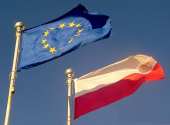 'Good to be together': celebrating 20 years of Poland in the EU
Poland's government has initiated a special social and informational campaign titled "Good to Be Together: 20 Years of Poland in the European Union," marking a significant milestone in theRead More...
'Good to be together': celebrating 20 years of Poland in the EU
Poland's government has initiated a special social and informational campaign titled "Good to Be Together: 20 Years of Poland in the European Union," marking a significant milestone in theRead More... -
 ÖBB unveils Summer Train Timetable with construction updates
As summer approaches, Austria's ÖBB gears up for extensive construction activities in the eastern region, leading to adjustments in train schedules along certain routes.Read More...
ÖBB unveils Summer Train Timetable with construction updates
As summer approaches, Austria's ÖBB gears up for extensive construction activities in the eastern region, leading to adjustments in train schedules along certain routes.Read More... -
 Rare book theft: Europol cracks down on international gang
In a collaborative effort involving European law enforcement agencies, Europol successfully apprehended four suspected individuals involved in the theft of antique and rare books.Read More...
Rare book theft: Europol cracks down on international gang
In a collaborative effort involving European law enforcement agencies, Europol successfully apprehended four suspected individuals involved in the theft of antique and rare books.Read More...

Most Read
- Teen held after US woman killed in London stabbings
- Football: Farhad Moshiri adamant Everton deal above board
- Greece hails new post-bailout chapter but concerns remain
- The Kokorev case caused wide discussion in Brussels
- EU accession talks stir debate in Moldova: insights from Gagauzia's leader, Yevgenia Gutsul
Politics
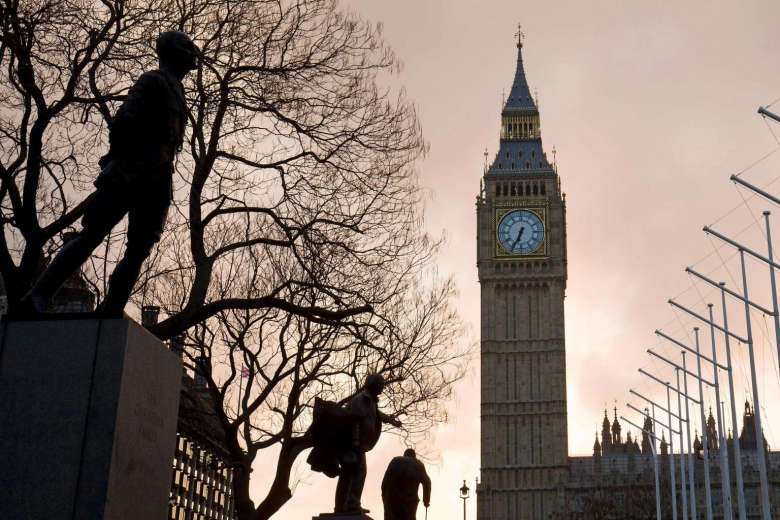
Big Ben will fall silent for several months while the iconic London clock tower next to the Houses of Parliament undergoes "desperately needed" repairs next year, officials said on Tuesday (April 26).
The bell, whose chimes feature on British radio broadcasts, will be silenced as part of the £29 million repairs.
The work will repair the clock faces and mechanism, cracks in the tower's masonry and corrosion in the roof, as well as restoring the edging around the clock faces to their original 19th-century colour.
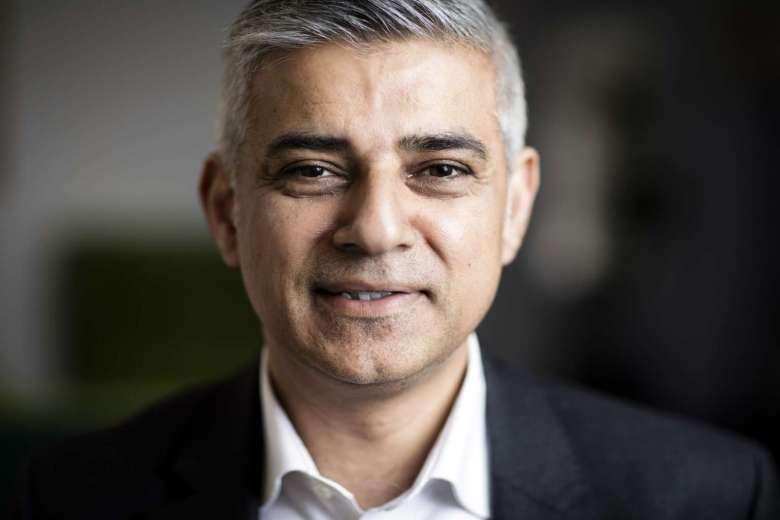
British Prime Minister David Cameron accused the main opposition Labour party's candidate for London mayor of associating with an alleged supporter of the Islamic State group on Wednesday, triggering a furious row.
Cameron's comments were aimed at Sadiq Khan, a Muslim former government minister and human rights lawyer who is leading opinion polls for the May 5 mayoral election.
During Prime Minister's Questions in the House of Commons, Cameron accused Khan of appearing alongside imam Sulaiman Ghani on nine occasions. "If we are going to condemn not just violent extremism but also the extremism that seeks to justify violence in any way, it is very important that we do not back these people and we do not appear on platforms with them," Cameron said.
The prime minister added that he was "concerned" about Khan, accusing him of appearing "again and again and again" with Ghani, saying: "This man supports IS." Cameron's comments were interrupted by an uproar from Labour MPs, some of whom shouted "racist" at him.
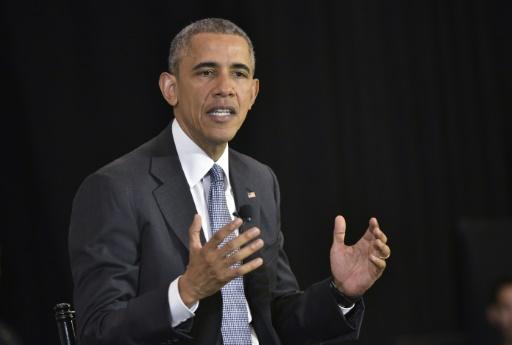
US President Barack Obama will be thrust into the eye of a boisterous British debate over European Union membership when he touches down in London on Thursday for a royal-filled visit.
The US president's four-day trip -- perhaps his last to Britain before leaving office next year -- comes ahead of a June 23 referendum when Britons will be asked if they want to remain in the 28-member EU.
Obama is sure to be asked to weigh in on the issue during a joint press conference on Friday after talks with Prime Minister David Cameron or at a town hall-style meeting with British youngsters on Saturday.
It may even come up at a lunch with Queen Elizabeth II at Windsor Castle on Friday -- a day after the monarch's 90th birthday, when the two heads of state will be joined by First Lady Michelle Obama.
Britain's departure from the EU -- so-called Brexit -- could have deep ramifications for Washington's "special relationship" with Britain, and on the stability of the European Union itself.
- 'Exorbitant hypocrisy' -
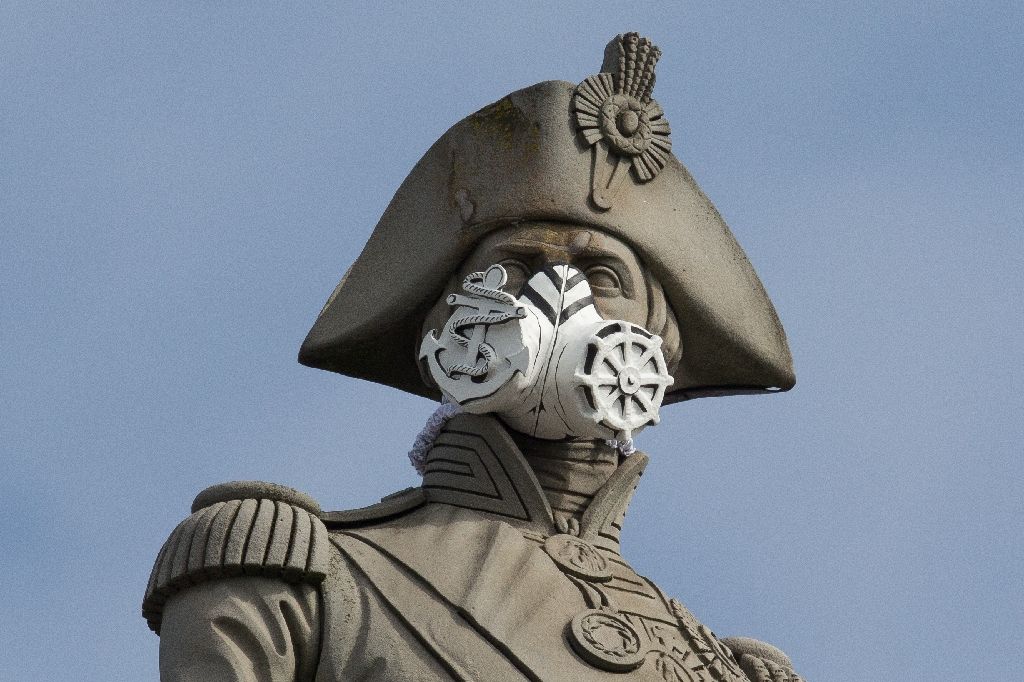
British environmental activists put face masks on famous statues across London on Monday including the one of Horatio Nelson on Trafalgar Square to draw attention to the problem of air pollution.
Two Greenpeace campaigners scaled the 52-metre (171-foot) high Nelson's Column in the early hours of Monday to put a mask on the famous naval commander.
Masks were put on 17 statues, including Queen Victoria near Buckingham Palace, Eros at Piccadilly Circus and Winston Churchill outside parliament.
London's Metropolitan Police said that eight people had been arrested -- two on Trafalgar Square, four on Parliament Square and two on Hyde Park Corner.
A parliament spokeswoman confirmed there had been "a minor security incident on the parliamentary estate" which was being dealt with by the police.
Greenpeace said it aimed to highlight the health risks caused by the city's poor air quality.
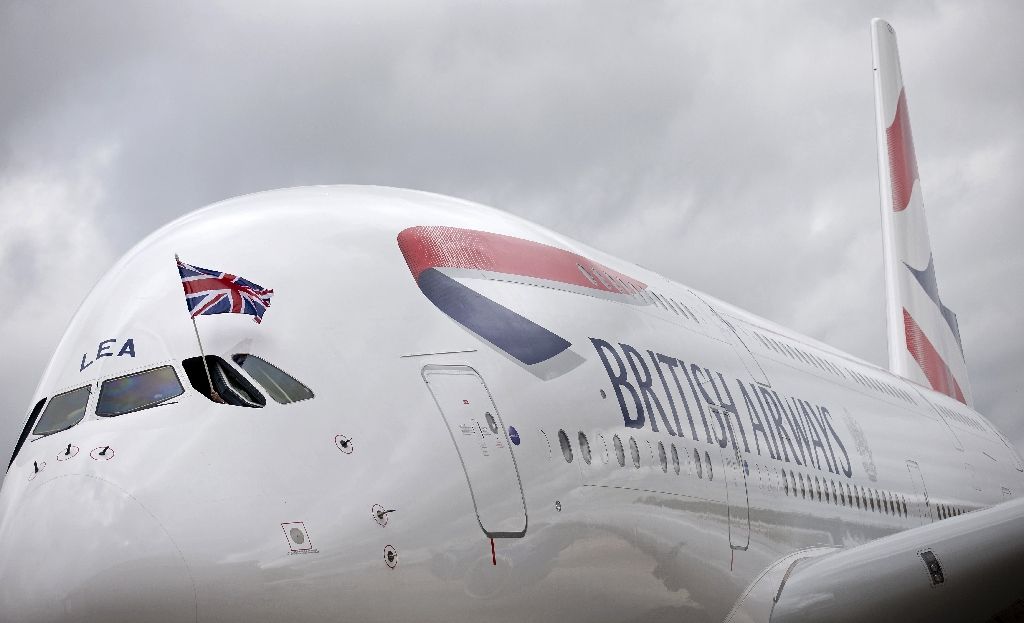
A British Airways plane struck an object believed to be a drone as it was coming in for landing at Heathrow, Europe's busiest airport, police said.
An investigation has been launched into the incident, which follows a string of near misses involving drones and is believed to be the first case of a collision in Britain.
The plane, an Airbus A320 with 132 passengers and five crew on board, was on its final descent into Heathrow when it was struck.
"A pilot on an inbound flight into Heathrow Airport from Geneva reported to police that he believed a drone had struck the aircraft," a spokeswoman for London's Metropolitan Police said.
"The flight landed at Heathrow Terminal Five safely. It transpired that an object, believed to be a drone, had struck the front of the aircraft".
A BA spokesman said the plane had been examined after landing and was cleared to operate its next flight.
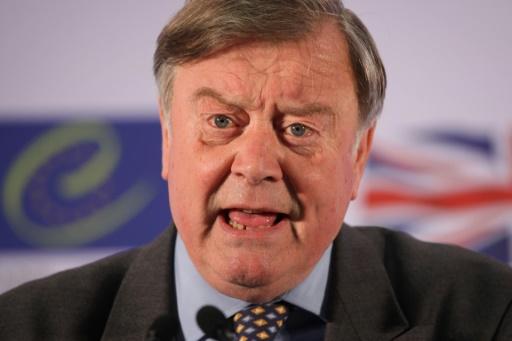
A senior lawmaker in David Cameron's Conservative party warned Saturday that the prime minister "wouldn't last 30 seconds" if Britain votes to leave the European Union in a June referendum.
Cameron confirmed this week that he intends to stay and oversee the process of leaving the 28-member bloc if voters back a so-called Brexit, despite leading the campaign to remain.
But Ken Clarke, a pro-European who served as a minister under Cameron as well as former Conservative premiers John Major and Margaret Thatcher, said such a situation would be "farcical".
"The prime minister wouldn't last 30 seconds if he lost the referendum and we'd be plunged into a Conservative leadership crisis which is never a very edifying sight," he told BBC radio.
At a rally for the campaign to leave the EU, leading Brexit supporter and London mayor Boris Johnson said the prime minister should stay in office regardless of the outcome of the referendum.
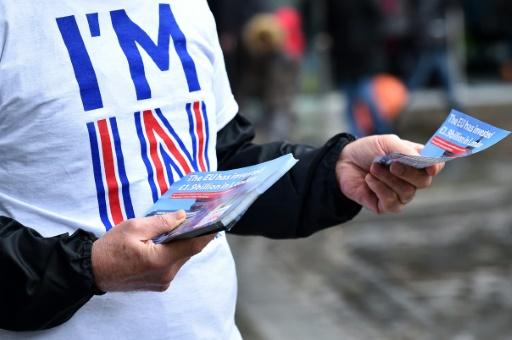
A time traveller from 1975 would find Britain's EU referendum strikingly familiar -- except that the two main parties have swapped roles on whether or not to remain in the bloc.
A prime minister, trying to appease the Eurosceptic wing of his fractured party, calls a vote on membership and encourages Britons to stay in, after securing some concessions from Brussels.
But back in 1975, when Britain voted on whether to stay in the European Economic Community it had joined two years earlier, it was a Labour prime minister calling the vote rather than a Conservative one.
In the June 5, 1975 referendum, 67 percent followed Harold Wilson's advice to stay in the EEC -- a result Conservative Prime Minister David Cameron would be more than happy with from the June 23 vote this year.
The Conservative opposition, under their new leader Margaret Thatcher, staunchly defended Britain's EEC membership, with the Iron Lady even seen campaigning in a jumper with the nine member states' flags on.
She accused Labour of putting Britain's future at risk in a bid to end their own infighting.
"The referendum is a tactical device to get over a split in their own party," she told parliament.
Her transformation to visceral euroscepticism was still 15 years into the future.
Today, the infighting is in the Conservative ranks, while Labour is broadly united in defending Britain's place in the European Union, the successor to the EEC.
Jeremy Corbyn, the socialist leader of the opposition Labour Party, spelled out his reasons for staying in on Thursday -- despite a long personal track record of Euroscepticism, including voting out in 1975.
"In contrast to four decades ago, the EU of today brings together most of the countries of Europe and has developed important employment, environmental and consumer protections," he said.
Professor Sara Hobolt, a European politics expert at the London School of Economics university, said the EU nowadays is about much more than just free trade, the main concern of its EEC predecessor.
"Centre-left parties in Europe find it easier to be pro-EU today than they did in the 1970s," she said.
- Europe has also changed -
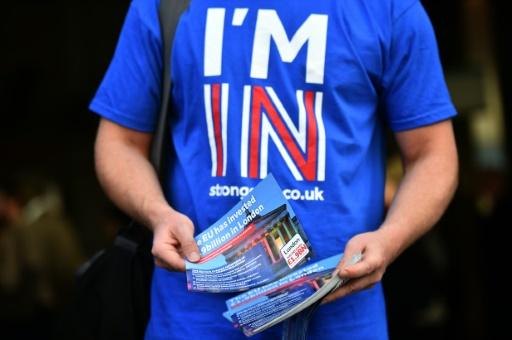
Activists hit the streets Friday for the first official day of campaigning over Britain's "Brexit" referendum, firing the starting pistol on a tense 10-week battle over the country's future in Europe.
Opinion polls suggest the British public is evenly split ahead of the June 23 vote, which could bring down Prime Minister David Cameron and plunge one of the world's leading economies into uncertainty.
The referendum -- Britons' first direct say on the divisive issue of Europe in 41 years -- is also being nervously watched in Washington and Brussels, where a British exit would add to a long list of EU crises.
"We absolutely think we're going to win it," Peter Reeve, a spokesman for the UK Independence Party (UKIP), told AFP as he campaigned in Peterborough -- a market town in eastern England where an influx of East European workers has angered many locals.
Charismatic London Mayor Boris Johnson will lead a "Brexit blitz" with rallies on Friday and Saturday where he will try to persuade Britons that they could thrive if cut free from European Union red tape.
Johnson has compared leaving the 28-country bloc to escaping from prison, saying the referendum was "like the jailer has accidentally left the door of the jail open and people can see the sunlit lands beyond".
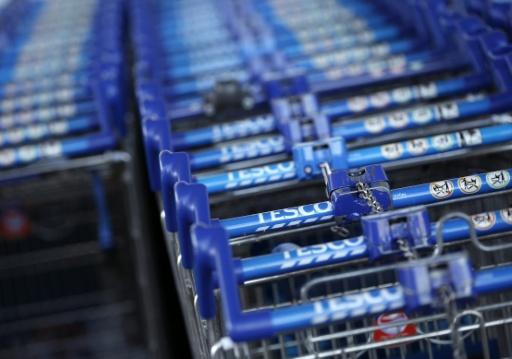
Tesco said Wednesday that it rebounded into slender annual net profits on strong sales, after a vast property writedown and challenging home trade sparked a record loss the previous year.
The troubled British supermarket giant revealed that earnings after taxation stood at £138 million ($197 million, 172 million euros) in its 2015/2016 financial year, which ran until the end of February.
That contrasted sharply with a enormous loss of £5.7 billion in 2014/2015, Britain's biggest retailer added in a results statement.
Pre-tax profits meanwhile stood at £162 million after a loss of £6.3 billion last time around.
Tesco hailed the "significant progress" as it returned to full-year profits, and also revealed the first quarter of sales growth for three years.
Like-for-like sales in home market Britain, stripping out the impact of new floor space, grew 0.9 percent in the group's fourth quarter.
Tesco -- which was rocked by crisis in October 2014 after overstating profits in an accounting error -- is the world's third-biggest supermarket chain after France's Carrefour and global leader Walmart.
- 'Regained competitiveness' -
"We have made significant progress against the priorities we set out in October 2014," said chief executive Dave Lewis in the earnings release.
"We have regained competitiveness in the UK with significantly better service, a simpler range, record levels of availability and lower and more stable prices.
"Our balance sheet is stronger and we are making good progress in rebuilding trust in Tesco and our investment case."
However, Lewis cautioned that the supermarket titan continues to face a "challenging, deflationary and uncertain market".
The group also warned that its investment in price cuts would slow its profit improvement particularly in the first half, sending its share price down sharply in Wednesday morning deals.
Tesco shares lost 4.81 percent to 186.85 pence, topping the fallers board on London's FTSE 100 benchmark index of top companies. The FTSE was however 1.11 percent higher at 6,311.7 points.
In recent years, Tesco's performance has been hurt by increased competition in Britain, particularly from German-owned discount retailers Aldi and Lidl, as well as Morrisons, Sainsbury's and Walmart-owned Asda.
In a bid to turn around its fortunes, Tesco appointed outsider and former Unilever executive Lewis in July 2014 to replace long-standing chief executive Philip Clarke.
Lewis said Wednesday that management actions had "stabilised" the business, which he admitted was in "crisis" when he replaced Clarke.
- Cost-cutting drive -
In January 2015, the Tesco boss launched a cost-cutting drive under which he has closed 60 unprofitable shops and axed plans to open another 49 branches.
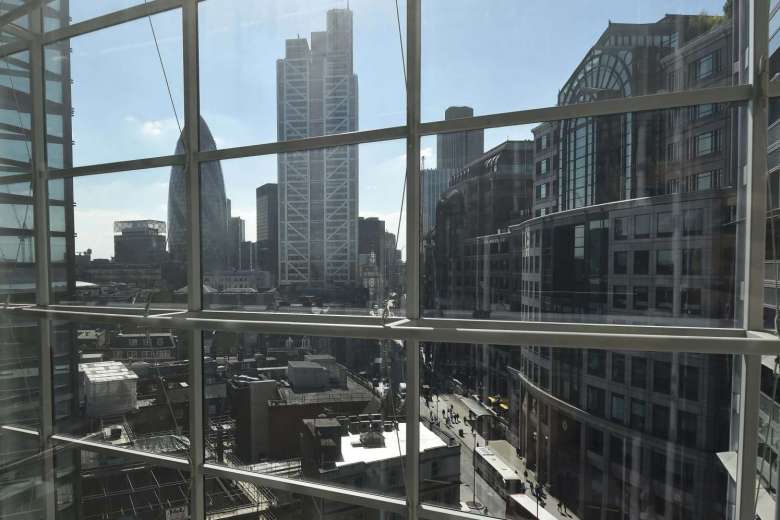
As-well as shining a spotlight on the secret financial arrangements of the rich and powerful, the so-called Panama Papers have laid bare London's role as a vital organ of the world's tax-haven network.
The files leaked from Panama law firm Mossack Fonseca exposed Britain's link to thousands of firms based in tax havens and how secret money is invested in British assets, particularly London property.
Critics accuse British authorities of turning a blind eye to the inflow of suspect money and of being too close to the financial sector to clamp down on the use of its overseas territories as havens, with the British Virgin Islands alone hosting 110,000 of the Mossack Fonseca's clients."London is the epicentre of so much of the sleaze that happens in the world," Nicholas Shaxson, author of the book Treasure Islands, which examines the role of offshore banks and tax havens, told AFP.
The political analyst said that Britain itself was relatively transparent and clean, but that companies used the country's territories abroad - relics of the days of empire - to "farm out the seedier stuff", often under the guise of shell companies with anonymous owners.
"Tax evasion and stuff like that will be done in the external parts of the network. Usually there will be links to the City of London, UK law firms, UK accountancy firms and to UK banks," he said, calling London the centre of a "spider's web".
"They're all agents of the City of London - that is where the whole exercise is controlled from," Richard Murphy, professor at London's City University, said of the offshore havens.

















